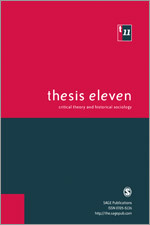 | |
| Discipline | Sociology |
|---|---|
| Language | English |
| Edited by | Peter Beilharz |
| Publication details | |
| History | 1980–present |
| Publisher | |
| Frequency | Bimonthly |
| Standard abbreviations | |
| ISO 4 | Thesis Eleven |
| Indexing | |
| ISSN | 0725-5136 (print) 1461-7455 (web) |
| LCCN | 91640863 |
| OCLC no. | 9911231 |
| Links | |
Thesis Eleven: Critical Theory and Historical Sociology is a peer-reviewed academic journal that publishes six issues a year in the field of sociology. It has been in publication since 1980 and is currently published by SAGE Publications. [1]